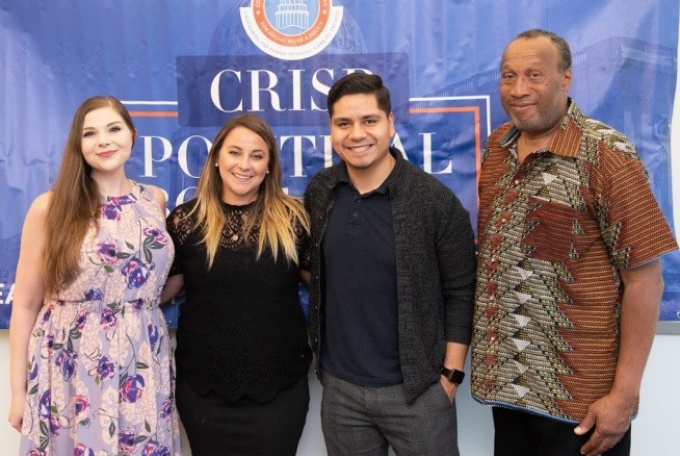CRISP Political Boot Camp to Empower Social Workers

Whitney Marris, Kristen Hibit, Hector Chaidez Ruacho, and CRISP President Dr. Charles E. Lewis, Jr., pictured at the CRISP Political Boot Camp and Media Training in Washington, D.C
By Judson Mead
There are currently six social workers serving in Congress: two senators and four representatives. Until she retired in 2017, after 30 years in office, Maryland Senator Barbara Mikulski was a social worker-politician.
How do social work and politics mesh? According to a well-known Mikulski dictum: “Politics is social work with power.”
The Congressional Research Institute for Social Work and Policy (CRISP) is a Capitol Hill think tank working to expand that power. Among other means, CRISP stages an annual three day Political Boot Camp as a crash course for social work students in getting and using political power.
Imagine an entire Congress of social workers. Some of them would certainly be UB School of Social Work graduates. Six UB students have already completed the training—and these are early days.
Colleen Kristich, MSW ’18, attended the boot camp’s second annual session, in the summer of 2018. Kristich, a community researcher at Buffalo’s Partnership for the Public Good, develops advocacy strategies with organizations working in the area of healthy housing.
She came away from the training inspired, sure that social workers can and should be involved in politics, and with a new understanding of her own impact: “I’m doing political social work.”
A year later she used some of the tools of the political trade she’d picked up at the boot camp. Her friend Kathryn Franco, MSW ’18, ran in a primary election for a Buffalo Common Council seat and asked Kritich to manage her campaign.
“I immediately dug out my CRISP folder,” Kristich said. “Without the boot camp I wouldn’t have known where to start.”
After a lot of hard work, including knocking on endless doors during a Buffalo February, Franco made a respectable showing but lost to the sitting council member. Kristich says she learned a lot.
“I really believe in the necessity of political power to advance the goals for social work issues, like health care, education, immigration,” she said. “We need to build collective power.”
When students are selected to attend the three-day boot camp, the School of Social Work provides airfare, tuition and lodging stipends.
Pat Shelly, the SSW director of community engagement and expansion, oversees applications for the program and facilitates student participation. She doesn't expect who attend to jump right into politics.
Rather, said Shelly, the school considers the training an investment, “so the social work profession will produce more policy makers, thought leaders, communicators, and office holders at all levels of public service.”
The CRISP Political Boot Camp packs its short program with how-to information sessions ranging from getting on the ballot to opposition research to crafting a policy agenda. It also includes a visit to Capitol Hill and time for the 25-30 participants to network and bond.
The sessions on creating a personal narrative and political social work resonated powerfully with Kristen Hibit, MSW ’20, who, along with fellow UB MSW students Hector Chaidez Ruacho, MSW ’20, and Whitney Marris, MSW ’20, attended the 2019 boot camp.
Hibit, an immigrant agricultural worker specialist with the New York State Department of Labor, hoped to bring home tools to help her advocate for system change from inside the public sector.
She’d wondered whether she was “political” enough to benefit from the training. Afterward, she said, “I was exactly where I needed to be.”
Before the boot camp, when people asked her what her master’s is in, she’d give a long answer, explaining macro social work. Now she simply answers, “Political social work.”
Hector Chaidez Ruacho already had experience in politics. In 2016, as an undergraduate at the University of Nevada– Las Vegas, he organized and caucused for Bernie Sanders. He got involved because he wanted to use his voice to address the way immigrants were being portrayed.
During his winter break this year, he was back in Las Vegas, once again canvassing for Sanders. “I’m using my micro skills door-to-door,” he said.
He additionally breathed the air on Capitol Hill when he was a member of UB’s social work student delegation to Student Advocacy Day in Washington in March 2019.
According to Chaidez Ruacho, the most powerful benefit of the CRISP boot camp was the connections he made with fellow students. “When we first met as a group, it was like we instantly clicked,” he said. “I now have a new network to engage with.”
Reflecting on what the CRISP experience taught him about making social work values heard in the political arena, Chaidez Ruacho wrote in a UBSSW blog post, “It reassured me that the future of this country is not one we should fear, but rather one we should shape by taking a seat at the table.”
He is now looking at a graduate fellowship with the Congressional Hispanic Caucus Institute as his next step.
Online MSW student Whitney Marris, who, as it happens, lives in the Washington, D.C. area, thought she wouldn’t be eligible for the boot camp opportunity but her faculty adviser, Denise Krause, encouraged her to apply.
Marris is a seasoned advocate and campaigner for both political candidates and causes, but, as a relative newcomer to social work, is still finding her way. She may have learned more about herself at the boot camp than about political mechanics.
“The discourse at the boot camp allowed me to make great connections,” she said.
By the time the program was over, Marris said the intensity of those connections left her sure that social work is the right platform for her to work for a better world.
“This is my place,” she said.